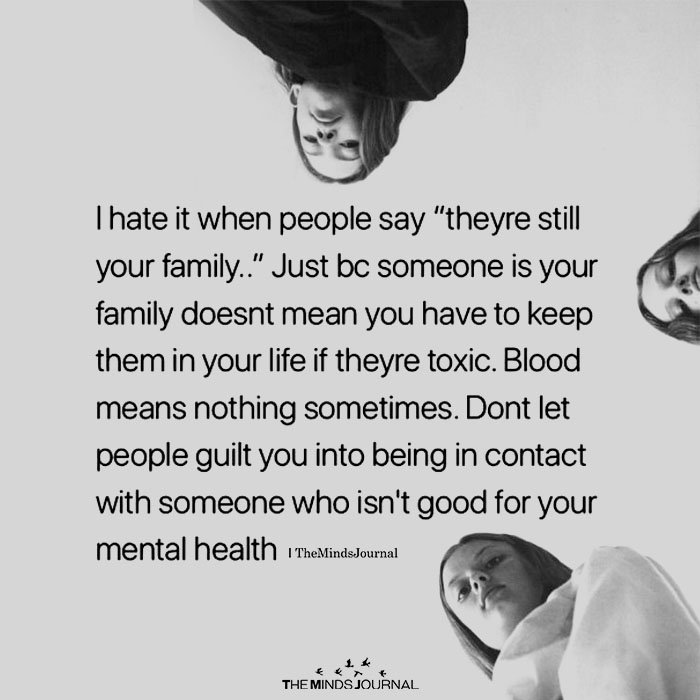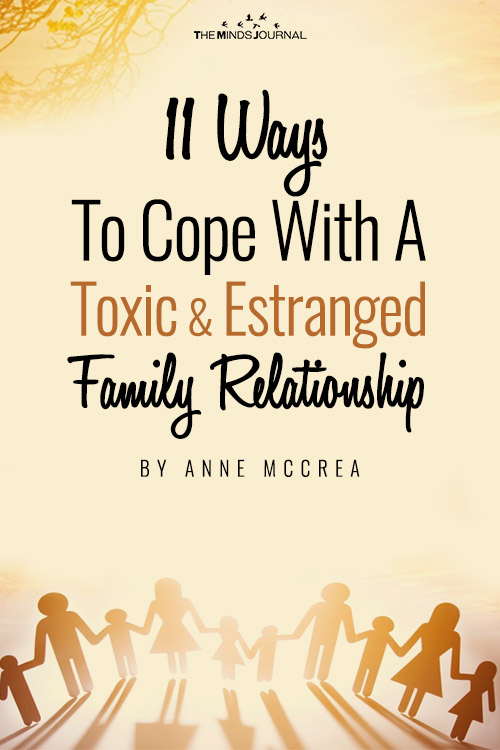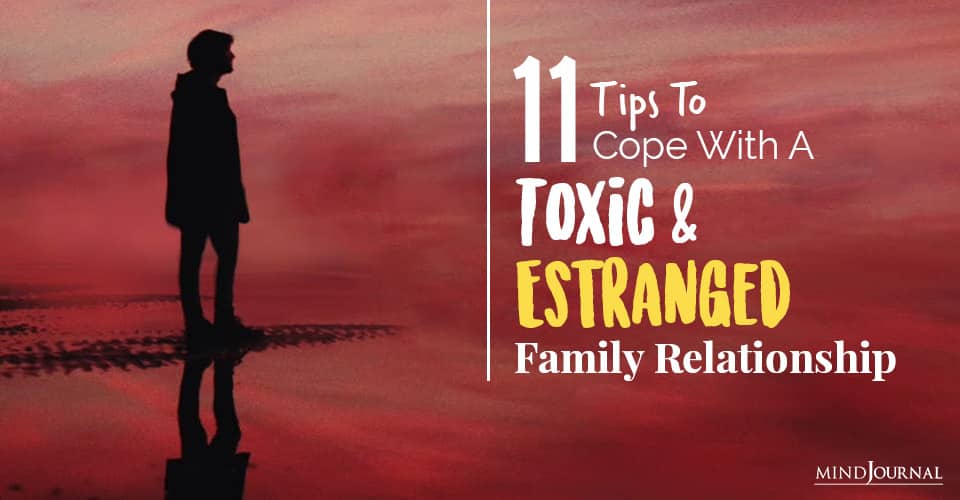Do you have a toxic family, with whom you are estranged and share a very unhealthy and toxic relationship, and no matter how hard you try, you just can’t seem to cope with them properly?
“Letting go doesn’t mean giving up, but rather accepting that there are things that cannot be.” ~Unknown
You two are family. Maybe you grew up with them and were by their side for a huge chunk of their life. There was a lot of laughing, crying, and sharing. Some fighting too.
You know how their brain works probably better than anyone else. But sometimes, in adulthood, those closest to you can become unrecognizable—estranged, cold, and careless. For no apparent reason, you find yourself shut out of their life. Your peace-feelers are increasingly rejected. You’ve been left out in the cold.
There is always a reason why people turn out the way they do. But, sometimes the metamorphosis is so gradual that it sneaks up on you, and one day, you wake up and wonder, “How did it come to this?”
You want them back. So you start to question and blame yourself. Was it the time I chose to go to the party instead of keeping her company? Was it when I used his things without asking? What did I do to deserve this? What can I do to make it better?
Related: Toxic Family Ties: When to Let Go Abusive Family Relationships
While it’s good to ask yourself such questions, sometimes the lesson you are meant to learn is to let go of the memory of who they were and accept who they have become.
This is based on my own relationship with my sister. We’d always been close, and when I was growing up, I looked up to her as my role model. I was shy, nerdy, and runty. She was pretty, popular, and good at sports.
But after she went to college and, four years later, I followed suit on another continent, our lives didn’t really intersect. When we did meet, we’d butt heads about a lot of things. She had grown bitter in the years’ post-high school, while I’d grown up, become assertive, and was impulsively exploring the world. Still, despite our differences, I thought we’d always be there for one another.
Then she got married to a man who doesn’t get along with me or our parents. They began living in a strange emotional autarky.
She grew very cold, defensive, and resentful toward our family and began to cut me out of her life. I tried to reach out and mend the relationship, but she refused to open up. She’s always been proud that way.
One day when I told her I loved her and wished we could be close like before, she replied, “That was a long time ago.”
Over the last few years, the relationship has really gone downhill. I’ve struggled with the hurt of “losing” my sister, as well as feelings of self-blame as I struggled to find a reason for her change. I have racked my brain for memories of what I could’ve done wrong, but my mind draws a blank.
Then, I decided I didn’t want to dwell on feeling hurt any longer. I didn’t want to keep longing for and trying to rekindle the sisterhood we once had.
I have come to realize my sister is not the person I once knew, and I have to accept that, learn to let go, and move on. That is how I decided to take certain decisions for the sake of my own happiness and mental health.
I hope this advice can help those who may be experiencing a toxic and estranged relationship with a family member with whom they had once been close.
Here are 11 ways to cope with toxic and estranged family relationship:
1. Identify in what ways the relationship may be toxic and how it makes you feel.
A toxic relationship can manifest in many ways. Perhaps your relative always puts you down, lacks empathy, acts passive-aggressive, or ignores you when you speak.
Once you have pinpointed the person’s patterns of behavior, become aware of how this affects your mood, body language, energy levels, self-esteem, and peace of mind. Knowing how to recognize toxicity and its effects is the first step to understanding your feelings and empowering yourself to deal with the situation.
2. Accept that you may never find the root cause for your relative’s behavior.
People do therapy for years—there’s never a simple answer. You may be able to talk to your relative to find out why s/he acts a certain way. You may not. Sometimes, the reason why a person treats you badly may not have anything to do with what you’ve done, but might just be the way they process and respond to their own life experiences. Hardships may strengthen one person and make another bitter.
In any case, try to re-frame toxicity by understanding it tends to come from a place of unhappiness or discontent. People’s hurtful actions will then become less hurtful to you when you realize they reflect their inner state rather than you.
Related: Why It’s Okay To Cut Toxic Family Members Out of Your Life
3. Do not normalize toxicity.
If you have done nothing wrong, don’t forget it is not normal for anyone to continually be negative, inconsiderate, and hurtful toward you. It is very easy to lose perspective about what is right and wrong, especially when you are constantly justifying a person’s behavior with stories of their past traumas or hardships.
People tend to make concessions for difficult or estranged loved ones because they wish to forgive and forget, avoid conflict, or do not want to push the person farther away. Empathy is good, but it cannot be used to keep making excuses for terrible behavior. Sometimes you need to set limits and say “enough!” before such behavior becomes the new normal.

4. Don’t expect anything from your estranged relative.
Yes, you might expect your family to have your back because you’d do the same, but don’t count on it with an estranged relative with whom you struggle to maintain a relationship.
I’ve learned not to be dependent or expect any help from my sister, even though I grew up believing that’s what siblings should do for one another.
5. Realize it takes two people to fix a relationship.
As much as you try, if the other person is not ready or not willing, you may not fix much. The relationship will remain toxic for as long as the person is unable to change.
You cannot blame yourself for it. You have done your best.
6. Decide how much space you want to give them in your life.
You will probably encounter your relative again at family gatherings, or you may need to communicate with them about family matters. In this case, minimize the amount of time you spend in their presence and keep communication to a minimum.
Sometimes, though, you may need to cut them out of your life entirely, whether permanently or momentarily. Keeping a space open for them and constantly making the effort to reach out is emotionally exhausting.
Once you have deemed you have tried enough and done your best, don’t feel guilty about drawing the line and deciding that enough is enough.
Related: 10 Tips To Deal With Toxic Family Members Without Losing Your Mind
7. Don’t bottle things up.
Communicate your feelings to people you trust. If the person knows your relative, you may learn that they also share the same feelings of hurt and disappointment in dealing with him/her.
Talking through your feelings is therapeutic and helps you acquire perspective about the situation.
In my case, my parents also have a toxic relationship with my sibling, and I found that letting them talk about it and encouraging them not to bottle things up has been a great release for them.
8. Refrain from frequently gossiping about your relative, especially to a wide circle of people.
There is a difference between sharing your feelings with people you trust and constantly focusing all conversations on this individual and what s/he did or said. You risk getting into the habit of speaking badly of someone, and the conversation will often just keep going around in circles. Also, the negative talk can return to your relative’s ears and feed the cycle of negativity and estrangement.
Instead, decrease the mental and emotional energy spent thinking about your relative, and focus on the positive aspects of your life and your loved-ones’ lives.

9. Don’t give your relative an opportunity to blame you.
People like my sister are often extreme narcissists who blame everyone but themselves. It is important not to give him or her ammunition for this blame-game.
If he/she always shows up late, acts rude, never tidies up, or uses your things, resist the temptation to do the same in return. Do the right thing and s/he won’t be able to reproach you for anything.
10. Accept you may not be able to have a frank, heart-to-heart conversation.
My sister goes through life demonstrating a character devoid of vulnerability or weakness. If you are faced with an emotionally inaccessible and excessively proud individual, you may have to accept the fact that you may never have that cathartic moment of truth you so crave.
Strive for closure on your side and move on.
Related: 10 Signs of Toxic Family Enmeshment and How It May Impact You As An Adult
11. Shift your focus.
Do not dwell on the pain and hurt of “losing” a relative. Don’t focus on trying to grapple with the toxic relationships in your life. Build upon the positive ones you have instead.
Accept the cards that life has dealt you and make the best of them. Live your life and cultivate your soul.
Be content and grateful for what you have and who you are, for that is more than enough to fill a heart with happiness!
Author unknown Originally appeared in Narcissistic And Emotional Abuse











Leave a Reply